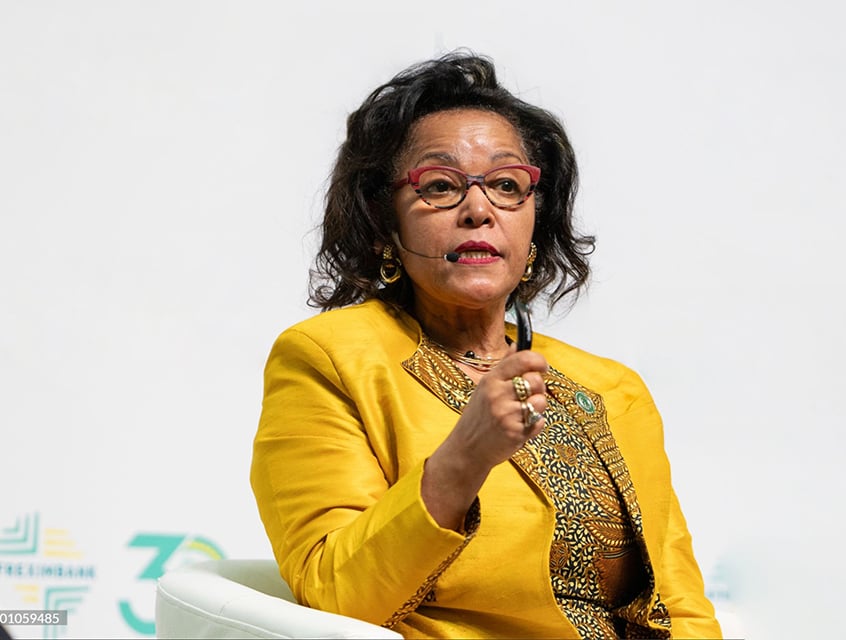
This article was produced with the support of AUDA NEPAD
During Africa Climate Week, held from 8 to 10 September in Addis Ababa, Nardos Bekele-Thomas (right), CEO of the African Union Development Agency (AUDA-NEPAD), launched a continent-wide consultation on what could become Africa’s most significant intervention in global carbon markets. The African Integrity & Equity Principles for Carbon Markets represent a bold attempt to rewrite the rules of engagement, ensuring that Africa captures its fair share of climate finance while maintaining the highest standards of environmental and social integrity.
Bekele-Thomas said: “We are launching consultations on a strategic initiative that will shape Africa’s climate finance journey for decades to come: the African Principles for Equity and Integrity in Carbon Markets.”
Addressing historical inequities
The timing could not be more critical. Despite Africa’s vast potential for climate mitigation – from renewable energy projects to nature-based solutions – the continent has been systematically underserved by global carbon markets. Under the Clean Development Mechanism, less than 3% of registered projects originated from Africa, with minimal local ownership or community benefit.
“Today’s rapidly expanding carbon markets present both unprecedented opportunity and significant risk for Africa,” explains Bekele-Thomas. “Without clear governance frameworks tailored to our contexts, we risk repeating historical patterns of exclusion and exploitation.”
The new principles directly address these concerns by establishing what AUDA-NEPAD calls “Africa’s Gold Standard” – a comprehensive framework that centres African leadership while ensuring genuine climate impact and meaningful development outcomes. Bekele-Thomas said: “These principles are not a preface to action: they are action. They will allow project developers to align their designs to these principles; buyers can preferentially source credits that meet them; governments can embed them in national frameworks and communities can assert their rights and benefits grounded in these principles.” She further welcomed collaboration with partners such as global benchmarks organisations the Integrity Council for Voluntary Carbon Markets (ICVCM) and the Voluntary Carbon Markets Integrity Initiative (VCMI), and private-sector partners. She declared that AUDA-NEPAD will finalise all consultations and formally launch these principles at the UN climate change conference COP30 in Belém, Brazil in November.
Five pillars of integrity
The African principles are built on five interconnected pillars, each designed to address specific market failures:
Supply-Side Integrity ensures that carbon credits originate from robust, additional mitigation activities. This includes rigorous measurement, reporting and verification systems, with all data publicly disclosed to ensure traceability. Projects must demonstrate clear additionality and deliver measurable, long-term climate benefits.
Demand-Side Integrity requires that credits complement, rather than substitute, real emissions reductions. Corporate buyers must demonstrate alignment with science-based targets and show progress on direct emissions reductions before using credits for residual emissions.
Environmental Integrity mandates that all projects deliver genuine, lasting climate benefits without harming ecosystems. This includes robust safeguards against leakage and non-permanence, with appropriate risk management mechanisms to address potential reversals.
Social Value Integrity ensures equitable benefit-sharing and inclusive participation, with particular attention to women, youth and Indigenous peoples. Projects must demonstrate clear contributions to poverty reduction, gender equity and climate resilience.
Market Integrity promotes transparent, equitable pricing that reflects the full value of credits, including their social co-benefits, while providing predictable demand signals to incentivise sustained investment.
Beyond compliance: a development framework
What distinguishes the African principles from existing international frameworks is their explicit focus on development outcomes alongside climate impact. While recognising valuable work by the G7, UK and other initiatives, the African framework addresses contexts and priorities that have been largely overlooked in global standard-setting processes.
The principles accommodate three main use cases for African carbon credits: authorised compliance transfers under Article 6 of the Paris Agreement; voluntary corporate offsetting; and the International Civil Aviation Organization’s carbon offsetting scheme (CORSIA). Crucially, they require clear authorisation and corresponding adjustments for credits used toward national climate commitments, preventing double-counting while maintaining transparency about credit status and intended use.
Implementation roadmap
AUDA-NEPAD has outlined an ambitious implementation timeline. Following the current consultation phase, a refined draft will be presented at the second African Climate Summit, with public comments incorporated before the final version launches at COP30 in Brazil.
The agency is calling on all market actors – credit buyers, donors, registries, investors and technical partners – to adopt the principles across their activities and invest in African systems and institutions that enable their implementation.
“We need capacity building, MRV tools, and institutional readiness at national and local levels,” emphasises Bekele-Thomas. “This is not just about setting standards; it’s about building the infrastructure for Africa to lead in climate finance.”
Other key speakers at the launch of the draft principles included Max Andonirina Fontaine, Madagascar’s minister of environment and sustainable development, who said that in his country carbon markets are a huge opportunity; Madagascar is advanced in terms of carbon regulations, so they are excited about the work AUDA-NEPAD is doing. They are developing a legal framework to be able to attract investors and that the principles are a tool not an end to be used in the most optimised way.
Pan-African Parliament President Chief Fortune Zephania Charumbira said that the African principles have the support of all parliaments in the African continent, and pleaded that carbon markets be subjected to robust governance and that revenues generated are transparently managed and invested back into African communities.
Market response and challenges
Early reactions from the carbon market community have been cautiously positive, with several major buyers expressing interest in piloting purchases aligned with the new principles. However, significant challenges remain, including the need for methodology development that reflects African realities while maintaining high integrity standards.
The principles also acknowledge that some existing global frameworks, such as the Integrity Council for the Voluntary Carbon Market’s Core Carbon Principles, do not fully incorporate African contexts, particularly in how additionality is assessed for community-driven projects.
A continental vision
The African principles represent more than technical standards; they embody a vision of climate action rooted in equity and self-determination. By establishing clear rules that prioritise both environmental integrity and social value, Africa is positioning itself not as a passive recipient of climate finance, but as a leader in defining what high-quality carbon markets should look like.
As global attention increasingly focuses on the role of carbon markets in achieving net-zero targets, Africa’s intervention comes at a pivotal moment. The continent’s vast mitigation potential – estimated at over 15bn tonnes of carbon dioxide equivalent annually – could play a crucial role in global climate goals, but only if markets are designed to deliver lasting benefits for African communities.
The success of these principles will ultimately be measured not just in tonnes of carbon reduced, but in whether they can transform carbon markets from instruments of climate colonialism into engines of inclusive development. With COP30 on the horizon, Africa is making clear that it intends to set the terms of engagement for the next phase of global climate action.






Recent Comments